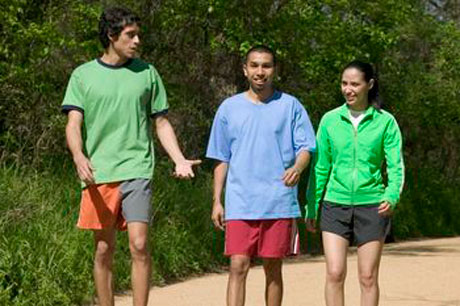(单词翻译:单击)
情景对话
Edwin: Hey Buddhi, how ya going?
埃德温:嗨,布迪,你好吗?
Buddhi: I'm good Edwin, how are you?
布迪:我很好,埃德温,你呢?
Edwin: I'm not too bad. Did you do anything last weekend?
埃德温:我还行。你上周末做什么了吗?
Buddhi: Yes, I did. I went out with a bunch of friends after a very long time. And, yeah, I had a nice time.
布迪:有。我和一群朋友久违地出去玩了。我周末玩得很愉快。
Edwin: What did you guys do downtown?
埃德温:你们在市中心做什么了?
Buddhi: First, for lunch we wanted to go out for lunch and then we did some window shopping. None of us had saved up enough for any actual shopping, so it was window shopping, and then we did some karaoke and we went out for some dancing. It was nice. I enjoyed my Saturday.
布迪:我们先去吃午饭,然后去橱窗购物了。因为我们所有人都没有存够实际购物的钱,所以我们只能橱窗购物,之后我们去唱卡拉OK、跳舞了。我过得非常愉快。我很享受这个周六。
Edwin: Do you love karaoke?
埃德温:你喜欢卡拉OK吗?
Buddhi: I do. I do. I end up losing my voice the next day.
布迪:我喜欢,喜欢。第二天我的嗓子完全哑掉了。
Edwin: How as the dancing? Are you a bit of a dance master?
埃德温:跳舞怎么样?你是舞蹈大师吗?
Buddhi: I wouldn't say that. Well, I love dancing, so we had a nice time. How about you? How was your weekend?
布迪:我不这样认为。不过我喜欢跳舞,我们玩得很开心。你呢?你周末怎么过的?
Edwin: My weekend was alright. I just went down to the city and did a bit of shopping.
埃德温:周末还好。我去城里购物了。
Buddhi: So, did you spend a lot?
布迪:你花了很多钱吗?
Edwin: I spent about two hundred dollars.
埃德温:我花了大概200美元。
Buddhi: OK.
布迪:好。
Edwin: Bought some winter clothing, and it's getting a bit cold these days, so yeah.
埃德温:我买了几件冬天的衣服,最近越来越冷了。
Buddhi: I'm not a very winter person. Do you like winter?
布迪:我不太喜欢冬天。你喜欢冬天吗?
Edwin: No, I don't like winter. I'm a very summer person.
埃德温:我也不喜欢冬天。我喜欢夏天。
Buddhi: Oh, really. Well, I don't like when it's too warm. And you like it?
布迪:哦,真的吗?我不喜欢太热的天气。你喜欢吗?
Edwin: I prefer to sweat rather than freeze.
埃德温:与严寒相比,我宁愿出汗。
Buddhi: So do you like sea bathing and like outdoor activities?
布迪:那你喜欢海水浴等户外活动吗?
Edwin: Yeah, I love the sun so, I like a lot of outdoor activities. It's better than being cooped up in a room.
埃德温:我喜欢太阳,有很多户外活动我都喜欢。比关在家里好多了。
Buddhi: In my case, I'm not a very outdoor person. But now summer. Definitely not summer. I'd say my favorite season will be spring.
布迪:我不太喜欢户外活动。现在是夏天。我不喜欢夏天,我最喜欢的季节是春天。
Edwin: Ah, I guess, yeah. Spring is a nice time. Not too hot, not too cold.
埃德温:我认为春季是个好时节。不太热也不太冷。
Buddhi: Yeah, yeah. Especially, I guess because I'm from a tropical country, and we are used to that kind of weather.
布迪:对。而且因为我来自热带国家,我们已经习惯了那样的天气。
Edwin: I see. I guess Australia's summer's not so tropical. It's just a lot of dry.
埃德温:我明白了。我认为澳大利亚的夏天不太像热带,而是非常干燥。
Buddhi: Yeah.
布迪:好。
Edwin: So, I guess Sri Lanka in Australia is really different?
埃德温:我想斯里兰卡和澳大利亚非常不同吧?
Buddhi: It's quite warm, and throughout the year, it's quite hot, warm and in the hill country, you'll feel that it's like fall. You'll wanna wear, you know, some warm clothes, but it's really nice, you know you feel like having something cold or, being a bit cold, you go to the hill country. If now, you stay in the beach area.
布迪:非常热,全年都很热,而山区的温度就像秋天一样。让你想穿上些暖和的衣服,不过这很好,如果想去凉爽的地方,去山区就好了。要是现在这个季节,就待在海滩就好了。

译文属可可原创,仅供学习交流使用,未经许可请勿转载
重点讲解
重点讲解:
1. a bunch of 一伙,一群(人);
例句:A bunch of children were at play.
一群孩子在玩。
2. save up 储蓄;积攒;攒钱;
例句:People often put money aside in order to save up enough to make one major expenditure.
人们常常为了一笔大的开销而存钱。
3. end up 最终;结果;到头来;
例句:Wasteful people usually end up in debt.
挥霍浪费者最后往往负债。
4. be used to sth./going sth. 习惯于;
例句:She is not used to the new environment.
她对新环境不习惯。


